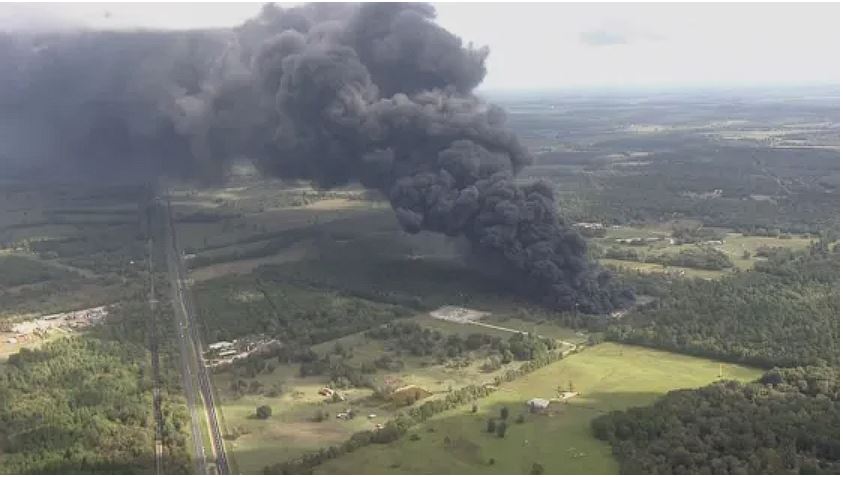Below, learn more about this horrifying incident and what areas you should avoid. Additionally, the chemical injury lawyers at Kherkher Garcia will explore the potential consequences of chemical plant explosions like this one.
Chemical Plant Explosion Information
According to the San Jacinto County Office of Emergency Management, an explosion at the Sound Resource Solutions petroleum plant this morning led to a fire, evacuations of surrounding areas, and a shelter-in-place order. The plant manufactures solvents for paint remover and glue, which contain flammable chemicals. The initial explosion caused a chemical fire that sent dark plumes of smoke drifting above nearby homes and businesses.
At least one person was injured in the fire, but they are expected to make a full recovery. Out of an abundance of caution, a nearby school was evacuated as the fire roared. Initially, officials issued a five-mile radius shelter-in-place order, but that was reduced to one mile by mid-afternoon.
Officials have closed Highway 59 due to the explosion and are asking the community to use alternative routes, if possible. Officials are continuing to monitor air quality in the area around the plant. Polk County officials also urged local residents down-wind to turn off their HVAC systems until the smoke clears. Polk County officials state that the plant houses chemicals that are known to have,
“acute toxicity, carcinogenicity, and reproductive toxicity, and may cause serious eye damage or eye irritation, skin corrosion or irritation, aspiration hazard, and organ toxicity.”
Potential Consequences of Chemical Plant Explosions
Chemical plant explosions can have serious and far-reaching consequences. Some potential consequences include:
Injuries
People who survive the explosion may still suffer from injuries, ranging from minor to severe. The types of injuries can vary depending on factors such as the nature of the chemicals involved, the proximity to the blast, and the safety measures in place. Some common injuries include:
- Traumatic Injuries: These can result from the blast itself, causing injuries such as fractures, lacerations, contusions, and traumatic brain injuries. Flying debris and collapsing structures can contribute to these injuries.
- Burn Injuries: Chemical explosions often involve the release of flammable substances, leading to fires and explosions. Burns can range from minor to severe, with potential for third-degree burns requiring extensive medical treatment.
- Respiratory Injuries: Inhalation of toxic fumes or dust particles can cause respiratory distress, irritation, and damage. Depending on the chemicals involved, respiratory injuries may range from mild irritation to severe lung damage.
- Chemical Burns: Direct contact with corrosive or toxic chemicals can cause chemical burns on the skin and eyes. These burns may be immediate upon contact or develop over time, depending on the nature of the chemical exposure.
- Eye Injuries: Chemicals released in explosions can cause eye irritation, burns, or even permanent damage. Protective eyewear is crucial in preventing or minimizing these injuries.
- Internal Injuries: The blast wave from an explosion can cause internal injuries, such as damage to organs, internal bleeding, and injuries to the digestive or respiratory systems.
- Psychological Injuries: The psychological impact of being involved in or witnessing a chemical plant explosion can lead to mental health issues, including post-traumatic stress disorder (PTSD), anxiety, and depression.
Loss of Life
The most immediate and tragic consequence is the potential loss of human lives, both among plant workers and nearby residents.
Environmental Damage
Chemical explosions can release hazardous substances into the air, water, and soil, leading to environmental pollution. This can cause the following environmental damage:
- Air Pollution: Explosions can release a variety of toxic gases and particulate matter into the air. These pollutants can pose respiratory risks to humans and animals, and they may contribute to air quality degradation over a wide area.
- Water Contamination: Chemical spills resulting from explosions can contaminate nearby water bodies. Hazardous chemicals may leach into rivers, lakes, or groundwater, affecting aquatic ecosystems and potentially harming the quality of drinking water sources.
- Soil Contamination: Chemicals released during an explosion can settle into the soil, leading to contamination. This can impact plant and microbial life in the soil, disrupt ecosystems, and pose risks to agriculture if the contaminated soil is used for cultivation.
- Ecological Impact: The release of toxic substances can harm wildlife and plants in the affected area. Aquatic organisms may be particularly vulnerable to waterborne pollutants, leading to fish kills and other ecological disruptions.
- Long-Term Effects on Flora and Fauna: Some chemicals may persist in the environment for extended periods, causing ongoing harm to plant and animal life. This can disrupt the balance of ecosystems and have lasting effects on biodiversity.
- Impact on Nearby Vegetation: Plants in the vicinity of a chemical plant explosion may be directly affected by the blast, fire, or exposure to toxic substances. This can lead to defoliation, loss of vegetation, and changes in the local plant community.
Property Damage
The explosion can cause extensive damage to nearby structures, including homes, businesses, and infrastructure. This can result in significant economic losses. In some cases, residents may be forced to evacuate their homes due to the immediate dangers.
Economic Impact
The disruption to local businesses, infrastructure, and the potential cleanup costs can have a substantial economic impact on the affected region. The cost of cleanup itself is enormous. Some estimates suggest that the annual cost of cleanup after chemical incidents in the U.S. is more than $477 million. By and large, Texas and Louisiana lead the nation in the most chemical plant incidents between 2004 and 2020.
Overall, the consequences of chemical plant explosions are multifaceted and can have lasting effects on individuals, communities, and the environment. Efforts to prevent such incidents and mitigate their impacts are crucial for ensuring the safety and well-being of everyone involved.
What to do After a Chemical Plant Explosion
Chemical plant explosions are dangerous to those in the direct vicinity, but the danger also extends into nearby communities – sometimes in the days, weeks, and months that follow an incident. If you are in the vicinity of a chemical plant explosion, taking prompt and appropriate actions is crucial to protect your health and wellbeing.
Here are some general steps to consider:
- Seek Medical Attention: If you or others are injured, seek medical attention immediately. Call emergency services or go to the nearest hospital. Inform healthcare professionals about the nature of the incident and any potential chemical exposure.
- Evacuate Safely: If you are in the vicinity of the explosion or the affected area, follow evacuation procedures if they are in place. Move to a safe location away from the source of the explosion and any potential hazards.
- Contact Emergency Services: Report the incident to emergency services (e.g., 911) and provide details about the location, injuries, and any hazardous materials involved.
- Follow Official Guidance: Follow any instructions or guidance provided by local authorities, emergency responders, or law enforcement. Stay informed about updates and evacuation orders through official channels.
- Document Injuries and Damages: Take photos or videos of your injuries and any property damage. This documentation can be valuable for insurance claims and legal purposes.
- Preserve Evidence: Preserve any evidence related to the incident. This may include clothing, personal belongings, or anything that could be relevant to an investigation.
- Report to Authorities: Report the incident to relevant environmental and regulatory authorities. This can help initiate investigations and ensure appropriate measures are taken to address environmental hazards.
- Monitor Your Health: Stay vigilant for any delayed symptoms or health effects related to chemical exposure. Follow up with healthcare professionals for ongoing monitoring and treatment.
- Stay Informed: Stay informed about developments related to the chemical plant explosion, including cleanup efforts, health advisories, and any long-term risks.
- Contact Legal Counsel: If you believe the chemical plant explosion was due to negligence or misconduct, consult with a chemical injury attorney to explore your legal options.
Remember, these steps are general guidelines, and the specific actions you should take can depend on the nature of the incident, local regulations, and the advice of emergency responders. Always prioritize your safety and the wellbeing of those around you.
Contact a Chemical Injury Lawyer
If you choose to contact a lawyer for advice or legal representation after a chemical plant explosion, choose a law firm that has the knowledge and resources you need to protect your rights and pursue the best outcome possible. At Kherkher Garcia, we have more than 30 years of experience representing victims in matters involving chemical plants, oil and gas refineries, and offshore employment.
If you have questions about injuries or illness after a chemical plant explosion, we can help! Call us at 713-333-1030, or complete our online contact form for your free consultation. Let us help you find answers and protect your rights and wellbeing.
Resources:
- https://www.theguardian.com/us-news/2023/nov/08/texas-shepherd-chemical-plant-explosion
- https://www.nbcnews.com/news/us-news/texas-chemical-plant-explosion-sparks-large-fire-evacuation-shelter-pl-rcna124206
- https://www.theguardian.com/us-news/2023/feb/25/revealed-us-chemical-accidents-one-every-two-days-average
- Image from KPRC


